FRDN Knowledge Hub Network Day 2022
By the Knowledge Hub program committee: Jolien Berckmans, Veerle Van den Eynden, Inge Van Nieuwerburgh, Maja Sahadzic, Paula Oset Garcia, Ziad Choueiki, Hanne Vlietinck, Alexander Botzki, Charlotte D’Eer
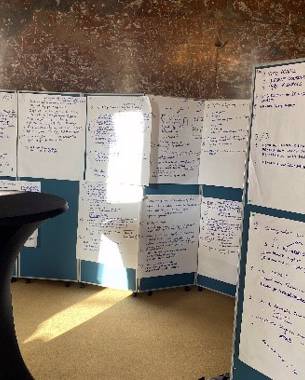
On 25th February, the FRDN Knowledge Hub welcomed 77 research data professionals at het Paleis der Academiën in Brussels to participate in the 2022 Network Day “As open as possible, as closed as necessary? Ethical and legal aspects of managing and sharing data.” Exactly one year after the online kick-off event in 2021 and after a year of interesting monthly lunch sessions on various RDM topics, it was time to look forward to meeting each other in person.
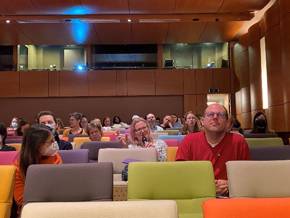
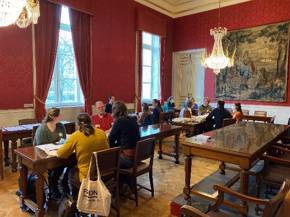
As a run up to the network day, the organizers (the program committee) did a short poll with the Knowledge Hub members on what topics they were interested in discussing at an event. One theme that kept returning was the legal aspects and challenges of Open Science (GDPR, Intellectual Property Rights,…). Although everyone is familiar with the European tagline “as open as possible, as closed as necessary”, its meaning often raises questions. For example, because the effective linking of open science practices to innovation and business models requires careful consideration of issues related to the directive of copyright in the digital single market such as Intellectual Property Rights (IPR), licensing agreements and privacy law. It was exactly the goal of the network day to dive in these topics and to familiarize ourselves with legislative frameworks. Moreover, the program committee organized break-out sessions to enable the exchange of information and experiences about tools and processes that data stewards can use in their daily practice.
(Inter)nationally renowned speakers on Open Science, IPR and Privacy Law
On behalf of the Knowledge Hub program committee, librarian and open science specialist Inge Van Nieuwerburgh (UGent), kicked off the network day and introduced us to Alea de San Roman Gonzales (European Commission). She explained to us the pioneering role of Horizon Europe in its choice to embrace open science. She guided us through the Model Grant Agreement requirements of Horizon Europe and the way in which RDM and Open Science practices are encouraged on a European level.
After this eloquent and clear introduction, Thomas Margoni (KU Leuven) dived into copyright law, data and licenses. He shed light on the often complex interaction between copyright and Open Science principles, suggesting that it often depends on how data is structured or contained e.g. as a database, in literature,…, or on other rights beside the copyright or on different contracts, technologies etc. Alea Lopez summarized the presentation for us as she tweeted the following:

In addition, Prof. Margoni shared with us some interesting tools and documents online (on the protection of research data, licenses, reuse, repositories and a more general info site)
To finish off the morning presentations, Geert Van Grootel (EWI) gave an interesting talk on open data and reuse for public sector information in which he explained 1) the Open Data directive used to apply to governmental data 2) that research data are now also covered by the Open Data Directive. He also hinted at the importance of the EU strategy for data that will further the impact of the role of research data in the future.
In the afternoon, the thematic focus was on privacy law. Prodromos Tsiavos from the Athena Research Center gave a talk on the basics of GDPR and Laurens Vangeel (KU Leuven) presented the KU Leuven cookbook for pseudonymization and anonymization which includes a theoretical framework as well as practical tips and tricks on how to anonymize and pseudonymize. Feel free to contact Laurens if you would like a sneak peek or more information about the cookbook!
-“It depends” is also a correct answer-
Beside the presentations from experts there were also interactive break-out sessions. Both in the morning and in the afternoon, everyone was presented with discipline- specific research use-cases (from life sciences, natural sciences or the social sciences) and received a set of questions on either IPR issues or privacy law. The aim was to act as data management advisor to the researcher on how best to address all IPR and privacy issues for the research data that would be used and created. Participants discussed responses to the questions and also highlighted further aspects that would need to be clarified with the researcher.
Many questions were answered with “"it depends on ...". This is not a wrong answer, but rather, it shows the need for dialogue with researchers on how IP and privacy are best addressed in research, and the need to establish the purpose of the research.
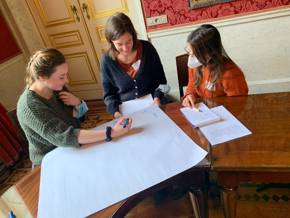
More than a correct outcome, these break-outs established a framework for collaboration, info sharing and cross-organizational exchange on RDM topics. The discussion also raised the need for good templates for data sharing agreements, consent forms, etc.
Also it is important to recognize the complexity of the questions that were raised. What to do for example with research data if your scholar works both in Europe as well as in India where different privacy laws are applicable? Or who to contact in your institution if a scholar is less keen on destroying sensitive data? Much can already be achieved by thinking through these complexities and how to address them before research starts. For example, when drivers are filmed in test-driving experiments to observe their behaviour, faces may not need to be filmed so data can be captured anonymously, or faces can be blurred after analysis.
Thinking about the future: follow-up for the Knowledge Hub
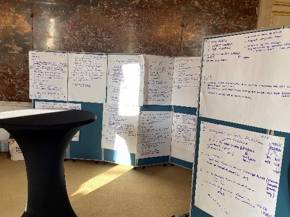
One thing is certain: the wall of posters that was presented at the end of the network day, showed the amount of hard work and thinking that everyone invested in the break-outs. It also opens up topics to address in the forthcoming lunch session. Possible topics could be the following: e.g. the legal base (for collecting personal data), data deletion, use of social media data: are there policies? How do you know if you can use these data? There was also a need to dive deeper into best practices on anonymization and pseudonymization. For example, can data collected during research with people be made anonymous and published openly, if so, how in practice?
Finally, the key takeaway from the network day is…it depends but let’s explore more what it depends on and untangle some of the questions that were raised during the break-outs. There is a clear need to discuss, share best practices and exchange experiences on the legal aspects of Open Science.